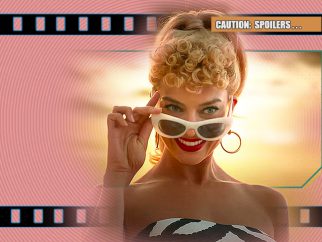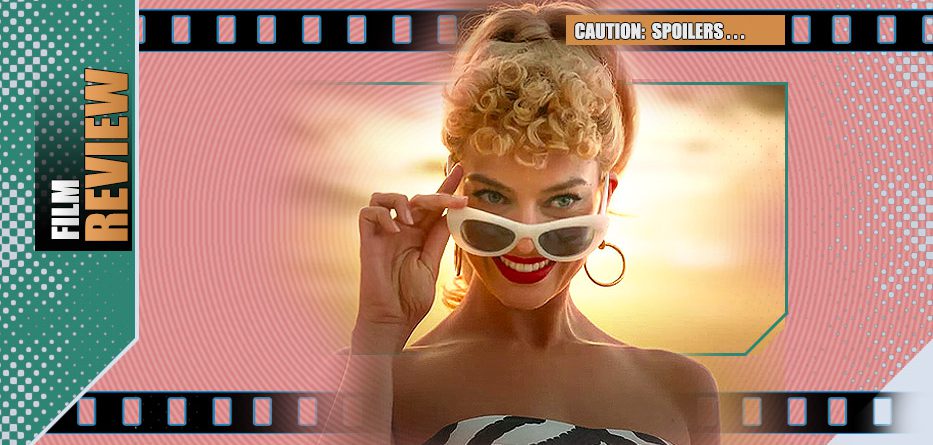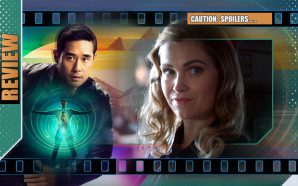Stereotypical Barbie enjoys the everyday generic life in Barbieland, celebrating a consistent life of never-ending non-surprises. So, when she suddenly starts to feel tired even introspective it completely unnerves her. She’s goes to see Weird Barbie, the one inhabitant of the town that might have some answers. It seems that a link to the ‘real world’ might be the cause, a psychic connection to someone’s inner feelings and frustrations leaking back into the artificial world and so Barbie (with Ken hiding himself in the pink trunk of her pink Cadillac) heads out on a personal mission to set everything right.
But Barbie believes that the influence of the Barbie brand and female empowerment has had on the world has been a wholly positive one and that she will be welcomed with gratitude… and she’s surprised and ill-equipped to deal with the conflicted way that both men and women perceive that ‘brand’. Ken, on the other hand, begins to see he’s not merely a supporting player… and in the real world, men often hold the power.
But if the ‘real’ and “Barbie’ worlds collide, what damage will be done… and will the party be over for everyone forever?
*spoilers*
If there was an Oscar for marketing – and it is an irony of, like, totally epic proportions that there is not – then the campaign for the Barbie movie would surely win across the board, perhaps having to share the statuette with a certain nuclear-bomb-baiting polar-opposite story called Oppenheimer to which it has now been anatomically-bonded for all time. A film that might have been a niche or cult film in the summer marketplace at best has been magically-transformed from a guilty-pleasure into a genuine must-see phenomenon across all demographics.
Barbie and its premise could and possibly should have been an unmitigated disaster, but director Greta Gerwig and her cast turn the glam up to eleven, tap-dance and swirl like a Broadway show around most of the potential pot-holes and give the whole enterprise a self-aware, feel-good mission-statement that lacks almost every form of subtlety but still delivers some emotional depth. Though it will likely not please all critics and audiences, this unlikely love-child of Legally Blonde and Pleasantville (with a side-helping of West Side Story, Grease, Rocky Horror and more) knows, at the very least, how to party.
Gerwig approaches the task with the right degree of irony – it’s a tightrope to simultaneously lampoon and love-letter a legacy brand – and yet from the 2001-styled opening to the last line of the film, the director fully embraces both sides of the argument, going over-the-top with each and then slowly reeling them in.
Margot Robbie is – despite a wry, in-film observation to the contrary – the perfect casting for its message and manages to walk the necessary acting tightrope, playing both the simplistic form of the iconic doll and the confusion of someone discovering there’s more to life than the generic wash and repeat of her existence to date… making us roll our eyes at her slowly devolving naivety in the ‘real world’ yet always pulling for her to somehow succeed in an existence separate from the in-box blurbs. Ryan Gosling fully commits to his bleach-bonneted primary Ken, totally enamoured of Robbie’s Barbie in particular, but also tired of his secondary status as merely a valet of the dolls and no more important than the dream house, suspiciously non-functional kitchen appliances or ambivalent ambulance playset. The other Kens are largely one-dimensional decoration but it’s fun to see Marvel martia-artist Simu Liu (Shang-Chi), the current head of the Secret Invasion Skrulls (Kingsley Ben-Adir) and incoming Doctor Who Ncuti Gatwa in flamboyant supporting roles (also watch out for blink-and-miss-it John Cena). Be warned, though… Kate McKinnon as Weird Barbie, as always, almost steals the film.
For all its preppy prepping, Barbie the movie isn’t perfect – it’s a confident film about self-confidence, over-confidence and confidence-tricksters that breezes along with plastic fantastic angst for the most part but somewhat swaps it out during a third-act for even more full-on camp set-pieces and lengthy, surreal dance routines celebrating the absurdity of it all. A few too-knowing lines might stop this from being a movie entirely suitable for kids, but it comes close to an all-ages romp. There’s an absolutely bonafide set of reasons that Barbie may not appeal to some, but it’s certainly subverts many expectations. Yet, there will be those who default weep and whimper into their eagle-eyed Action Men about ‘woke’ aspects yet still struggle to define their exact complaint, because for all its frills and flourishes, the film actually takes few prisoners in its slicing and dicing of the male/female dynamic and of Barbie’s real-life role as a positive and negative influence through the ages. The ladies are over-preened and pretty, self-satisfied and oblivious to the limits of their sterile, generic world – both knowledgeable in their assorted ‘roles’ (doctor, astronaut, businesswoman, President etc) of being anything they want to be, but not wanting to do anything with that knowledge. The men are perfunctory, quietly frustrated but going along to get along and then turning misogynistic as the film flips the dynamic with the imposition of the ‘real’ world and they over-compensate with their newfound ‘insight’. Both genders get equal grilling by the time we’re done, though America Ferrera, as the bridge between the worlds, gives a lengthy (but sadly accurate) speech about the complicated, contradictory roles women have to play and even parent toy company Mattel seems willing to get both brickbats and bouquets with their representation within the film. Okay, it’s one side of a story, but if that telling innately threatens you, there’ll be a Steven Seagal movie along in a minute.
Like the doll itself, the endless variations of Barbie… that either twisted and turned to fit in and be relevant (or made society twist and turn to fit her image, your mileage may vary on the notions of cause and effect)… are all highlighted in the film and the overt way they play with stereotypes, gender-roles and expectations. But whether you find it subservient or subversive, the film both celebrates and deconstructs that legacy with the result being silly but never stupid, over-virtuous but not entirely vacuous. It embraces and lampoons its own branding but lets you know that its self-aware enough – as a character and as a fuller movie – to know that it is doing so in real time. You can decide that the film is just a fun piece of fluff or a commentary on the artificial colliding with reality and the best praise of the film is that it essentially works as either…. a film that responds to how you approach it. No, Barbie‘s journey into the real world is not some kind of Homer’s Odyssey or Shakespearian ballad to be scrutinised for the ages, but it is a piece of pop-culture self-examination writ large. Some will say it’s a ‘feminist agenda’ as if that’s some huge crime, but it’s telling that a similar film could be made almost as well with a over-testosterone’d GI Joe figure entering the real world and also discovering the differences.
With marketing to die for, narration by Helen Mirren and one of the best final lines of any movie this year, Barbie may be artificial but it legitimately thinks outside the box of its own making… and, ultimately, you get the humour or the joke’s on you…

- Story8
- Acting8
- Direction9
- Production Design / VFX10










